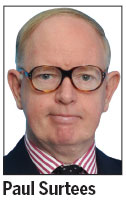Legal loophole undermines smoking ban
Updated: 2013-12-17 06:46
By Paul Surtees(HK Edition)
|
|||||||||
In these days of pre-Christmas office parties, many diners have been disconcerted to discover that the supposed ban on smoking inside bars and restaurants is largely ineffective, as clouds of smoke swirl in from those who puff away, regardless, just a few steps outside.
Hong Kong authorities have done much to limit the exposure of people to smoke, chiefly by introducing legal prohibitions on smoking inside restaurants, bars and places of work. This legal provision was clearly intended to protect customers and staff inside bars and restaurants from the poisonous fumes from tobacco - whether from a smoker's own intake, or from inhaling the second-hand smoke of others.
These days, nobody can say that they are unaware of the proven health dangers of smoking, meaning they have the freedom to choose to take up or continue their smoking habit in the full realization it might kill them.
However, bearing in mind the highly addictive nature of the effects of smoking tobacco, the question must be asked: Are those people who continue with their smoking habit really exercising their free will, or is their addiction pushing them to it?
Smokers do not have the right to endanger the health of others, and this is the key to the present perceived difficulty in Hong Kong. True enough, these days you seldom see anyone lighting up inside a bar or restaurant, and if someone does, they are generally swiftly asked to go outside. But not far enough away!

Many an open-fronted bar or restaurant, at street level in Hong Kong, actively encourages smokers to inflict their poisonous fumes on non-smokers inside. They very conveniently set up lines of tables, with ashtrays upon them, right at the frontage of their open-sided premises. While not, strictly speaking, located within the bar or restaurant's interior, in many cases they are situated inches, not even feet, away from the theoretical line dividing the establishment's open frontage from the public street outside. As a result, the fumes from the smokers, their own customers, who are technically outside, blow in to cause disturbance and health dangers to non-smoking customers inside. Stronger governmental enforcement action is needed to stop such establishments colonizing public street areas in this unhealthy way.
Clearly, these bar and restaurant owners seek to attract customers who are smokers, by these provisions; but also clearly, these measures deter non-smokers from wanting to enter their premises - particularly because to get in, they would have to pass through a smokescreen at the entry way!
In several other jurisdictions around the world, this provision is prohibited by law. Areas for smokers have to be well away from such open frontages. For example, nobody is allowed to smoke within 20 feet of an entrance in California, or within 4 meters of them in several Australian states.
It was clearly the new law's intention, when banning smoking within Hong Kong's bars and restaurants, to protect the staff and customers from the dangers of tobacco inhalation. Very lamentably, this legal loophole allows smokers to continue to poison the air within such open-fronted premises. This loophole makes an ass of the law, as it clearly goes stridently against the intention of these new regulations, which was to oblige such premises to become smoke-free zones.
Those responsible for framing Hong Kong's laws, doubtless led by the Department of Health's Tobacco Control Office, now need to close this legal loophole by introducing more stringent legislation to prohibit smokers indulging in their habit within, say, four meters of the open frontages of bars or restaurants. If not, little will really have been gained by introducing the earlier supposed "ban" on smoking within such places. At the moment, the air within them continues to be polluted by poisonous tobacco fumes. Any such stronger legislation would need to get through the Legislative Council.
Dr Judith Mackay, a long-term resident of Hong Kong and senior adviser to the World Lung Foundation comments: "The law needs urgent amendments - to tighten these loopholes in the smoke-free laws, and also to place the onus of responsibility on the owner or manager (This regulation has just been passed in Shenzhen)."
She said, "As in Hong Kong, this needs to be accompanied by quitting assistance, and also tobacco tax increases that have been proven to be effective in helping smokers quit, as well as discouraging youngsters from taking up the deadly smoking habit."
The author is a Hong Kong-based commentator and university lecturer who has lost several family members to the deadly effects of smoking. He is also an adviser to the Hong Kong Federation of the Blind.
(HK Edition 12/17/2013 page9)